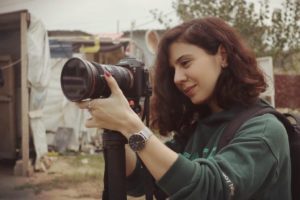“Watching my very self on TV”
I returned to Beirut after studying animation in Spain. I worked with a variety of film projects ranging from commercials to documentaries and TV programs, same as many friends who majored in cinema and audiovisuals. Subsequently, I joined the Action for Hope filmmaking program as a teacher.
Within the programs, we are expected to teach everything. The program lasts for intensive nine months, during which we teach children technical and theoretical principles. Students learn how to write a screenplay and the creative frameworks that go into filmmaking, after which they are given the chance to learn how to make a documentary and a narrative film. The different stages of the program involve practical exercises, where students are asked to shoot some films, culminating in their graduation project.
I didn’t have an easy first year with the Action for Hope program. I hail from the town of Jounieh and had lived abroad, but then had to teach individuals who’ve gone through some harrowing experiences, with some being very sensitive – as is to be expected. It took some time for me to find the most proper approach to address these differences. It was imperative that they regain their self-confidence which was next to none, particularly in their first year. We tried to push them forward. At first, they struggled to express themselves. They were afraid of the very notion of expression, as well as being judged by others. Initially, none of the students was able to come forward and talk about themselves or their personal experiences. To articulate ideas that stem from their inner selves was something insurmountably alien to them. Every time it happened that one of them try to talk about themselves, they would be in tears. Little by little, nonetheless, some cracks started to appear in those fortified walls they had built around themselves. With time, their self-confidence grew strong to a great extent.
A moment that I know will forever stay with me is what happened at one of my classes. We were focusing on building a story that emanates from a specific memory, and how it could be developed into a screenplay. I asked them to navigate through their memories and try and build a story that goes against what actually happened in reality. A girl and her sister had joined the film school. The girl began telling the story of her father who was stopped at the borders. Both the girl and her sister suddenly started weeping, and soon thereafter they everyone in the class started crying with them, including me. I felt this special and palpable fragility that we all shared; a fragility that is fused with an extraordinary strength which everyone in that class possessed. They, despite all the difficult and inhumane conditions they faced, miraculously managed to persevere and move on with their lives, holding onto every last fraction that they were unfortunate enough to experience at such a young age.
That girl decided to tell her story in a narrative short film as her graduation project. She decided to alter the events of the story. In her version, her father stays with her and he would hold her hand the whole time. That is, until the ending when a stray bullet enters the frame, but the audience never know who that bullet hit. This juxtaposition defies the approach a large number of professional directors take to documentaries. The narrative is those students’ escapism, or it could be seen as their way to reshape reality as they please. They would always say, “We are tired of seeing ourselves in this way on TV.”
Live Broadcast was another memorable short film to me. The movie depicts the story of a child and his family watching a World Cup match between Argentina and Germany on one enjoyable evening, only marred by the sporadic shelling in Syria. The film was screened at a festival in Beirut. It caught the audience by surprise (and it included accomplished figures such as Julia Kassar and Muriel Aboulrouss) for its amusing ability to move the audience through comedy.
I have been working with Action for Hope for three years now. I think it has been a transformative experience for me. I’ve matured quite a lot through this experience, thanks to those students I interacted with. I was constantly amazed by their ability to turn something very mundane into something grand. I’ve grown more attached to my work as time went by. My Fridays and Sundays are always devoted to the Bekaa. It’s such a pleasant and cheerful privilege to do this work, seeing that I get to provide people with a tool they need, and I get to draw from their energy and high spirits at the same time. The students ended up being my friends. The age difference is hardly a concern since those kids are indeed mature for shouldering responsibilities that far exceeded their age. The girl that directed Live Broadcast is now in Canada and we are constantly in touch. I’ve learned to love the simple things and to be humbler. I feel that I am more in touch with reality now. Interacting with those students on a daily basis have made me more of a human.

Author: Sandra Boutros
Activity: Film teacher
Story collected and compiled by: Mona Merhi
Date and place: June 1, 2019, Hamra – Beirut

